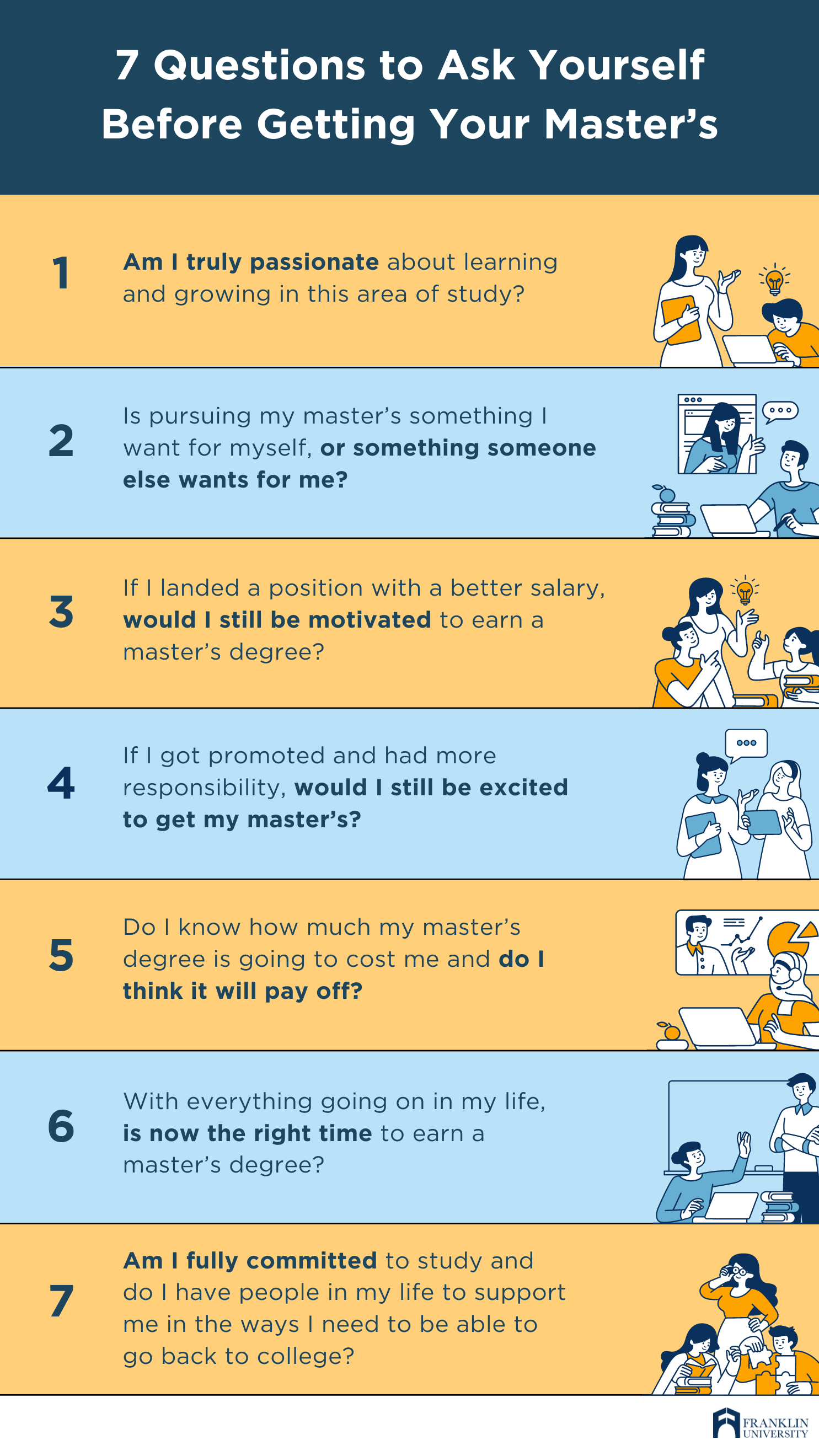Request Information
We're Sorry
There was an unexpected error with the form (your web browser was unable to retrieve some required data from our servers). This kind of error may occur if you have temporarily lost your internet connection. If you're able to verify that your internet connection is stable and the error persists, the Franklin University Help Desk is available to assist you at helpdesk@franklin.edu, 614.947.6682 (local), or 1.866.435.7006 (toll free).
Just a moment while we process your submission.

Do I Need a Master’s Degree? 4 Reasons Why It’s Worth It
Most people wonder if they really need a master’s degree to get ahead—and rightfully so. A master’s degree is a big investment of time, money and energy. It’s a decision that shouldn’t be made lightly. However, it’s also one of the most influential decisions you’ll make if you want to advance your career.
Are you considering a master’s degree, but want to make sure it’s worth it? Use this guide as a gut-check to see if you have the right motivations for getting a master’s degree.
Should I Get a Masters Degree?
Whether or not you should get a master’s degree is up to you but it can help to understand a few facts and figures about masters degrees first.
According to labor analytics firm Lightcast, 878,041 people earned a master’s degree in 2021–that’s an 8% growth rate from 2017-2021. That alone, is a pretty good indicator that a master’s degree has value.
Lightcast also reports that there were more than 14.67 million jobs in 2022 for those with a master’s degree. Moreover, that number is expected to grow 14.4% by 2032, meaning that employers are looking for people who’ve earned their master’s degrees.
So, should you get a master’s degree?
If you’re looking for job opportunities and career growth, the answer is YES.
If you’re still not convinced, keep reading to learn about four more reasons a master’s degree might be right for you.
What matters most when choosing a master’s program? Compare features, benefits and cost to find the right school for you.
4 Reasons Why You Need a Master’s Degree
1. It’s required to make a career move.
Like it or not, in a lot of fields, a bachelor’s degree is no longer enough. Yes, a bachelor’s degree is valuable, especially if you’re starting your career. But, when it comes to advancing into a management- or executive-level role, you may find yourself left behind if you only have a bachelor’s degree.
According to Lightcast, right now there are more than 1.6 million annual job openings that require a master’s degree. That’s evidence enough that a master’s degree is important, at least for certain fields.
Wondering if yours is one of them?
One of the best ways to find out is to look at the average annual salary for your chosen field. Typically, the more in-demand the occupation, the higher the salary.
Here’s a look at some of the highest-paying fields that require a master’s degree, along with their expected growth rate to 2032.

- Median Annual Earnings: $67,600
- Projected Growth: +15.3%
- Median Annual Earnings: $75,800
- Projected Growth: +13.6%
- Median Annual Earnings: $77,500
- Projected Growth: +16.7%
- Median Annual Earnings: $77,900
- Projected Growth: +26.5%
- Median Annual Earnings: $78,200
- Projected Growth: +23.3%
- Median Annual Earnings: $104,100
- Projected Growth: +19.7%
2. You’re passionate about learning more.
Passion is often one of the truest indicators of success at any level, including the master’s. It’s especially important if you want to get your master’s degree while working full time.
In fact, channeling your passion into your master’s degree can make it easier to:
- Stay motivated to attend classes, even after busy, challenging work days
- Engage and participate in lively discussions with your instructors and peers
- Stay current with industry news and trends, even outside of class assignments
- Take on a leadership role in a group projects
- Apply what you learn in class to your role in the workplace
- Excel in your studies
3. You want to become an expert.
A master’s degree also can help you deepen your expertise and become a thought leader in your field. It may even open the door to a world of new professional opportunities beyond your day-to-day responsibilities, such as:
- Speaking at industry conferences and events
- Mentoring junior professionals in your field
- Promote and publish your point of view in articles, books, publications, on social media and in podcasts
- Developing new strategic frameworks and initiatives for an organization
4. You’re looking to be more competitive in the job market.
When it comes to new jobs or new opportunities, a master’s degree can help you stand out. If you want to work at top companies in competitive and growing industries, a master’s degree can put you on the path to success.
Keep in mind that a master’s degree is more than a few initials on your resume. It’s proof that you:
- Have deep knowledge in a specific subject
- Are at the forefront of your discipline in terms of technology and hard skills
- Possess high-level critical thinking and problem solving skills, making you both a strategic and tactical asset
- Know how to maximize your team and your resources
Getting a Master’s Degree: 7 Questions to Ask Yourself First
There are very few reasons not to get a master’s degree. (Boredom being one of them.) But no matter where you are in your career, a master’s degree can re-ignite or propel your career in new ways you haven’t even thought of.
Of course, whether YOU need a master’s degree is really up to you. Here are some questions to ask yourself to help you decide.

If you confidently answered “yes” to most of these questions, then, congratulations, a master’s degree really could be right for you.
What’s the Best Master’s Degree Program?
The best master’s degree program is the one you’ll finish. It’s also the one that offers a cutting-edge curriculum, teaches you relevant skills, and offers support to fuel your success.
Remember, all master’s degree programs are not created equally. Do your due diligence and look for a program designed to meet the needs of a busy, working professional like you. Start exploring master’s degree programs here.





